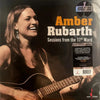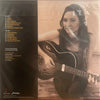



Amber Rubarth - Sessions From The 17th Ward (1Step)
Guitar, Vocals – Amber Rubarth
Cello – Dave Eggar
Percussion – Chuck Palmer
Violin – Tim Snider
Written by Tom Waits (A1), Amber Rubarth (A2-3, A5, A6, A7, B1-4), Charles Justin Palmer (A3, A5, B1), Dave Eggar (A3, A5, B1), Tim Snider (A3, A5, B1), Bert Kalmar (A4), Harry Ruby (A4), Oscar Hammerstein II (A4), Adam Levy (B3), Bob Dylan (B5), A. P. Carter (B6), Maybelle Carter (B6), Sara Carter (B6)
1 LP, standard sleeve
Limited edition
Original analog Master tape : YES
Heavy Press : 180g
Record color : black
Speed : 33 RPM
Size : 12'’
Stereo
Live
Record Press : unspecified
Label : Chesky Records - Chesky Original Masters Series
Original label : Chesky Records
Recorded at Hirsch Center, Brooklyn, New York on March 2012
Recorded by Nicholas Prout
Produced by David Chesky, Dave Eggar
Executive-Producer – Norman Chesky
Mastered by Nick Prout
Originally released in 2012
Reissued in August 2025
Tracks :
Side A:
1. Hold On
2. Don't You
3. Strive (Interlude)
4. A Kiss to Build a Dream On
5. Down Home (Interlude)
6. Novocaine
7. Darkest Dark, Brightest Bright
Side B:
1. Tundra (Interlude)
2. Good Mystery
3. Washing Day
4. Full Moon in Paris
5. Just Like a Woman
6. Storms Are on the Ocean
Reviews:
“Sessions From The 17th Ward is a live album, but don’t let that scare you off. This private show, recorded at St. Elias Church in Brooklyn, transfers very well to audio-only format. It’s a tight set-up—songwriter Amber Rubarth provides vocals and guitar, backed by cello (Dave Eggar), violin (Tim Snider), and light percussion (Chuck Palmer). This modest setting is the perfect environment for Rubarth’s performance to shine through.
Her voice is gentle and unassuming, and her songs follow on a similarly comforting path. She’s got her fair share of heartbreak here, but any and all personal woes come from an honest and understanding narrator (as opposed to self-indulgent catharsis). Along the way, songs are also interspersed with brief instrumental interludes that both build mood and add breathing space. My favorite tracks are “Washing Day,” the sparkling early morning ode to love and laundry, the swinging night-walk of “Full Moon In Paris,” and the simple and sweet “Darkest Dark, Brightest Bright.” Not every tune makes such an impression as these, but as a whole, the album is more placid than sedated.
The beguiling delicacy of Rubarth’s voice is especially apparent in her reverent takes on the work of Tom Waits, Louis Armstrong, Bob Dylan, and The Carter Family. These covers meld seamlessly with Rubarth’s original material, playing an important role in the cohesiveness of the album. Waits’ “Hold On” opens the set, and The Carter Family’s “Storms Are On The Ocean” ends it, both almost lullabies, solidifying the thread that carries the essential message of perseverance.
Sessions From The 17th Ward is a well-spaced and clean recording. It serves as a perfect showcase for Rubarth’s musical personality while retaining the vigor and playfulness of a live performance.” The Audio Standard Review
A showcase for Chesky Records' groundbreaking binaural 3-D recording technique, Sessions From The 17th Ward was the first of two albums the award-winning singer, songwriter, and actor Amber Rubarth recorded for the revered New York audiophile label. Noted for her plaintive voice and storytelling lyrics, the California-born singer/guitarist is beautifully accompanied by cellist Dave Eggar, fiddler Tim Snider, and percussionist Chuck Palmer. Rubarth serves up 14 mesmerizing tracks, ranging from indelible original songs ("Novocaine" and "Washing Day") to jazz standards ("A Kiss To Build A Dream On"), folk-rock evergreens (Bob Dylan's "Just Like A Woman" and Tom Waits' "Hold On"), Americana touchstones (the Carter Family's "Storms Are On The Ocean") and atmospheric instrumentals ("Tundra").
One Step. Instead of utilizing the industry-standard three-step lacquer process, one-step plating uses only one step, bypassing two processes of generational loss. One-step plating skip the regular father-mother process, going right to a single convert and then pressing. Though this dramatically increases mastering and production costs, it also assures each run is more consistent from disc to disc, with less noise, clearer details and deeper bass. Reducing production complexity to just a single "convert" disc between the lacquer and the press greatly improves groove integrity, diminishes non-fill anomalies and increases signal integrity from the master tape to your system.
Ratings:
Discogs : 4.5 / 5


